A new Congress leader may make an electoral impact by his very presence.
Congress voters who had moved away from the party, after being influenced by the BJP's 'family rule' campaign, can now return with a certain moral satisfaction, observes N Sathiya Moorthy.
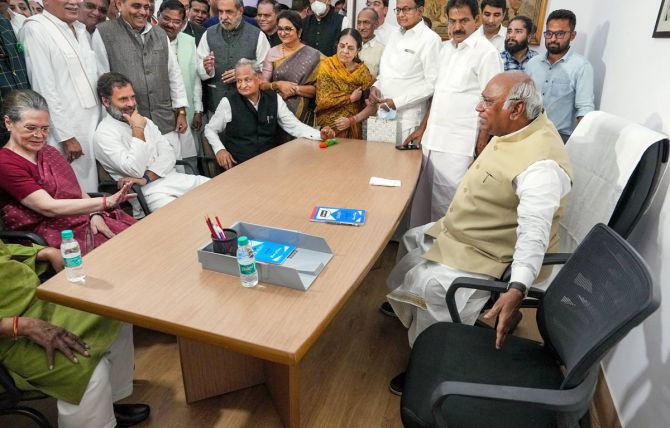
The expressions on the faces of Rahul Gandhi and other senior party leaders at this interaction between incumbent and predecessor truly makes for a Kodak Moment. Photograph: Manvender Vashist Lav/PTI Photo
Now that the Congress party has elected a 'non-family' leader as president after two decades, is the Centre's cancellation of an FCRA (Foreign Contribution (Regulation) Act) licence for two NGOs headed by outgoing acting party chief Sonia Gandhi, indicative of an unfamiliar nervousness in the ruling Bharatiya Janata Party camp after Narendra Modi became prime minister in 2014?
The answer is a qualified yes-and-no. The way the BJP, starting with the prime minister and going all the way down to the faceless social media activists, have been going after the Nehru-Gandhi family since before the 2014 elections, and keeping them in focus even after the Congress has shown no signs of an early revival to challenge ruling party through the past years, it looks as if they are either nervous -- or, are on a mission to cause a 'family mukt Congress' and a 'Congress mukt Bharat', which alone has been on their agenda through the past decade and more.
There is no denying the success of the Modi juggernaut against the Congress by keeping the Nehru-Gandhi family in sharp focus. It is in contrast to the earlier Vajpayee-Advani campaign that focussed on the 'foreigner's issue', centred on Sonia Gandhi. It did not sell in elections 2004, when the ruling BJP-NDA lost to Sonia Gandhi's slogan 'Aam Aadmi'. Modi's 'Achche Din' did the trick in 2014.
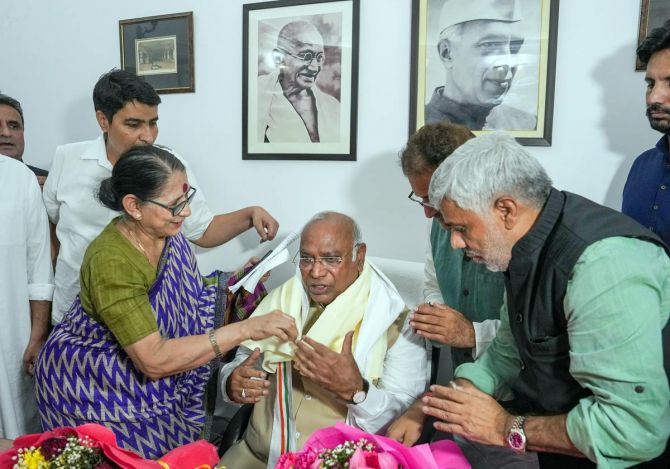
For all the massive victories that the BJP has scored since, Modi's campaign in 2014 focussed on unsubstantiated allegations of corruption against Congress-led UPA-II government of two-term prime minister Manmohan Singh.
The 2-G scam, where the CBI finally put the graft money way below the 'presumptive loss' of Rs 1.76 lakh crores, as claimed by then comptroller and auditor general Vinod Rai, and the Commonwealth Games construction scam, which became a national humiliation in Delhi, all did in the Congress-UPA, in elections 2014.
That the 2-G allegations did not stick before the trial court draws back memories to the media-driven BJP-NDA campaign against then Congress prime minister P V Narasimha Rao in the 'Lakhubhai Pathak corruption scandal', where again the court cleared PVN of wrongdoing, long after the ruling party had lost the post-reforms polls of 1996.
It is another matter that in the post-demolition Ayodhya situation, which witnessed violence and terror attacks, neither could the BJP make it. The nation wanted a non-Congress, anti-BJP government, and got one, even if it was a post-poll khichri formation, under the Janata Dal's H D Deve Gowda, followed by I K Gujral.
The BJP-NDA swept back to power in 1998 and 1999, with the slogan 'Give us a chance', after the 13-day fiasco in 1996.
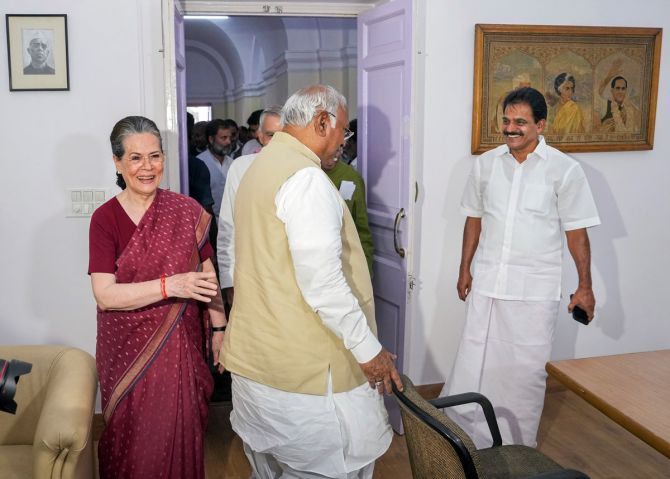
On the right is K C Venugopal, arguably the most powerful among the Congress general secretaries. Photograph: Manvender Vashist Lav/PTI Photo
If the question is whether Mallikarjun Kharge's elevation as Congress president, with unhidden yet unmentioned blessings from the 'first family', will help the party's sagging/non-existent morale and chances in the Lok Sabha polls of 2024, the answer should be a qualified 'No'.
At 80, Kharge does not inspire the younger generation of voters, especially in states where the party is next to non-existent -- which is covering most of the states and most seats in the 542-member Lok Sabha.
His performance as Union minister under Manmohan Singh earlier and as Leader of the Opposition in the Rajya Sabha does not inspire confidence in the party cadres that his election alone could do the trick.
Not that his defeated younger competitor, Shashi Tharoor, would have made a difference outside of elite urban constituencies, where he suffers from a mixed reputation preceding his arrival -- thanks to the hard work put in by the uncanny social media sleuths of the BJP rival.
Both Kharge and Tharoor lack Modi's charisma just now, not that Sonia, Priyanka and Rahul Gandhi together can make a difference. But at 66, Tharoor may have had his usefulness for marketing the party among overseas Indians and also foreigners, including government representatives.
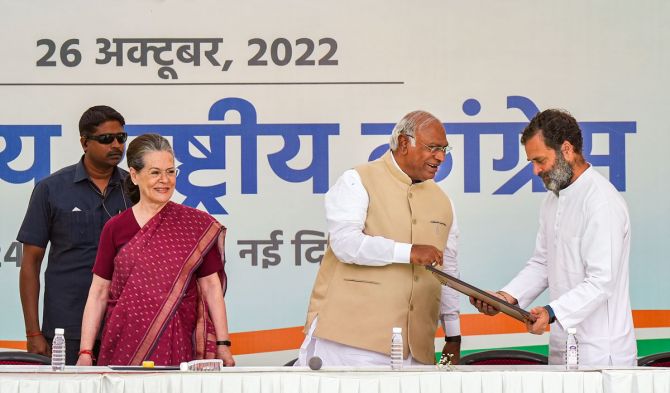
The octogenarian has also replaced an ageing Congress Working Committee with an equally ageing steering committee with a higher number -- 47 -- of members. With due respect to his erudition, efficiency and contributions, Manmohan Singh does not fit in in any role to revive the age-old party. A K Antony, 81, who wound up his Delhi establishment for retirement in Kerala, is there in Kharge's list.
It is not about age nor their contributions to the party in the past, but how active they are able to campaign for the party -- and in what role.
Maybe, the Modi-Shah duo in the rival BJP has had no use for the Margdarshak Mandal that they created after taking over, but that kind of an outfit of veterans may still have use in a sagging party as the Congress, especially when drafting the election manifesto -- and checking on the incumbent leadership from running away with ideas and promises that make a mockery of the system.
Kharge is lucky. A group of oldies who refused to make space for the younger generation, even if of their own choice, has left, citing 'lack of internal democracy' as the reason. Ghulam Nabi Azad belongs there. For reasons right and wrong,
Kharge has kept out Shashi Tharoor, his defeated competition. Not certainly out of spite, one should assume. Tharoor's inclusion could have helped credibility, but he is also wrecking credibility from within.
His camp had questioned transparency in the party president's poll and in did so public. Tharoor is also considered a maverick and a loose cannon, whose course is unpredictable and can be hugely embarrassing.
The party can leave much, if not all of it, behind.
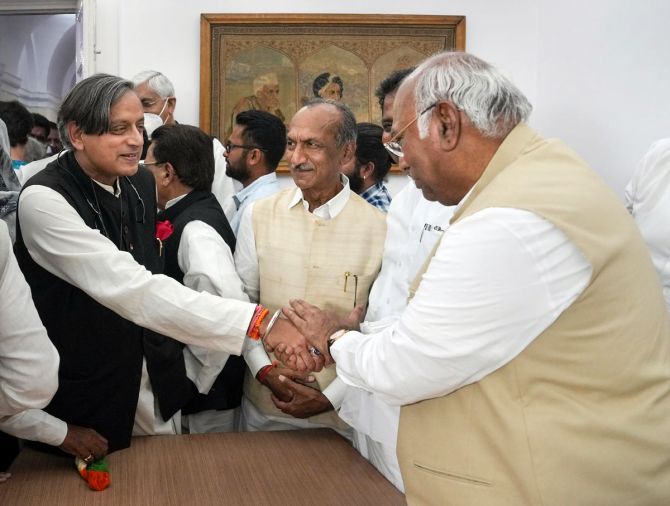
But where a new leader for the Congress in the current situation may make an electoral impact is by his very presence. Old-time Congress voters, independent of age, who had moved away from the Grand Old Party, after having been influenced by the BJP's 'family rule' campaign from the past, if they want to return, now they can do so with a certain sense of moral satisfaction, if any.
Then there are those who have been watching from the wings, the Modi-Shah monopoly of the BJP over the past nearly a decade, and draw parallels with the 'family rule' in the Congress. Though the BJP faced a similar situation even under the Vajpayee-Advani duo, there was no dearth of second-line leaders in the party who could speak their mind, both within the party and outside.
Today, Nitin Gadkari is the only mainline leader and senior Cabinet minister who does it, but in very many obtuse ways. The BJP's maverick leader Subramanian Swamy is the other, but he is not getting enough media space, which is required to reach out to the party cadres and the voters alike.
Through social media posts, Swamy has been riling the Modi government over the prime minister's continued reluctance to name China as the aggressor in Galwan-2020. This has not gone down well with Modi's 'nationalist constituency' that goes beyond the BJP's cadres and parent RSS's ideological backers.
A 'giant-killer' in his own way, Swamy is now talking about moving the higher judiciary on the 'Pegasus issue' through a PIL, but after consulting other 'stake-holders' (!)
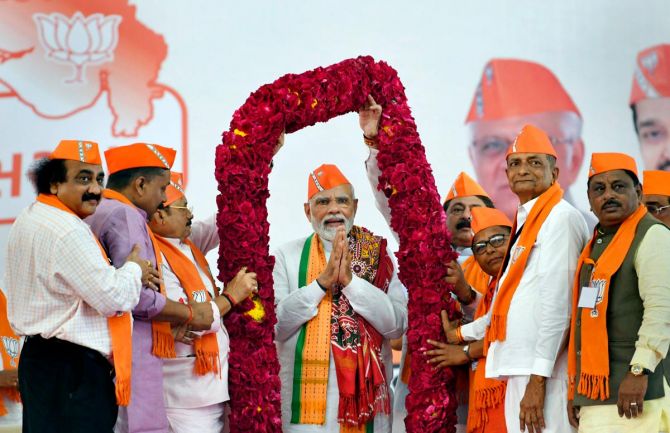
The BJP-RSS clan may have problems with the Modi-Shah duo's style of functioning, but for the Sangh Parivar to continue in power, they need Modi more than the other way round.
It is not as if without Modi or Shah at the helm, the Congress in particular and the otherwise divided Opposition in general can hope to defeat the BJP-NDA any time soon, but with Modi at the helm, the BJP would put the Opposition on the defensive, all over again.
From the Congress's stand-point, will Rahul Gandhi's Bharat Joda Yatra help revive the cadre-morale, if not voter-return? If that were to happen, then how would critics, especially from the BJP's social media, react -- and re-energise their multi-pronged attacks on the 'family'?
Or, will government agencies go after them again and again, and also against other Congress leaders, whether or not it includes the likes of Kharge himself?
Already, a section of the urban middle class seems to have developed a bad taste in the mouth for the kind of 'raid raj' that the BJP runs from the Centre, where no raid, arrest or seizure has been followed up to the trial stage even after years -- thus proving the unproven claims to innocence by the Opposition leaders, from different parties, thus targeted.
Whatever the legal consequences of such raids and arrests, experience has shown how the joy of 'over-kill' for the ruling party cadres has the potential to upturn the over-anxious voter's re-discovered concerns for democratic proprieties, constitutional rights and political morality.
It happened with the revival of Indira Gandhi's sagging political fortunes, post-1977 when the divided Janata Party government at the Centre went after her without evidence, with the result, a remand court in Delhi 'discharged' her without she having to apply for bail, when arrested.
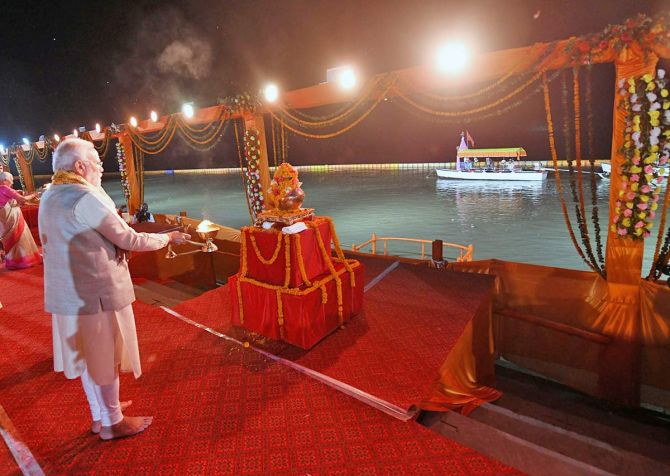
For now, the RSS has said that Ayodhya has lost the charm for BJP voters. Truth be told, Ayodhya even from the demolition days of 1992 did not help the BJP in elections. If anything, the post-demolition, the Opposition SP-BSP combine swept the assembly polls in Uttar Pradesh, a year later in November 1993. But the RSS seems to imply that all Hindutva issues have lost their purchasing power.
The revival of the BJP's poll chances in the nineties has more to do with the Janata-like coalition conundrum that afflicted the Gowda-Gujral governments, when the Vajpayee-Advani leadership sought a vote for stability when only their party and leadership was capable of providing the same.
It is this that is the BJP's USP under Modi, too, in 2024 as it was five years earlier, in 2019.
Then, there is the ubiquitous Modi brand of 'nationalism' which is much different from the Gandhian brand which the Congress party had propagated since the Nehruvian era -- and which is still an imaginative vote-catcher for the BJP.
However, there are those who believe that even this may have been an over-used card for the BJP-NDA, and the voters may not be overawed another time, as they were after the 'surgical strikes' against terror-targets in PoK, the last time round.
What then can be the election issue? While the Modi government's foreign policy achievements are a mixed bag, the real success story as flowing from the import of cheap Russian oil at the commencement of the Ukraine war, defying the US-led West would have reached the common man, if and only if that had led to a steep fall in petroleum product prices in the domestic market. It did not happen.
Likewise, the BJP has not been able to carry its 'nationalist message' vis-a-vis issues of human rights violations, when propped up by the international media and Western governments alike, to the masses. Instead, barring hard-core HindutvaM cadres, none seems to be anymore impressed with targeted attacks, both verbal and physical, against the nation's minorities. Whether there is still silent support for misadventures of the kind when linked to cross-border terrorism too is a million-dollar question.
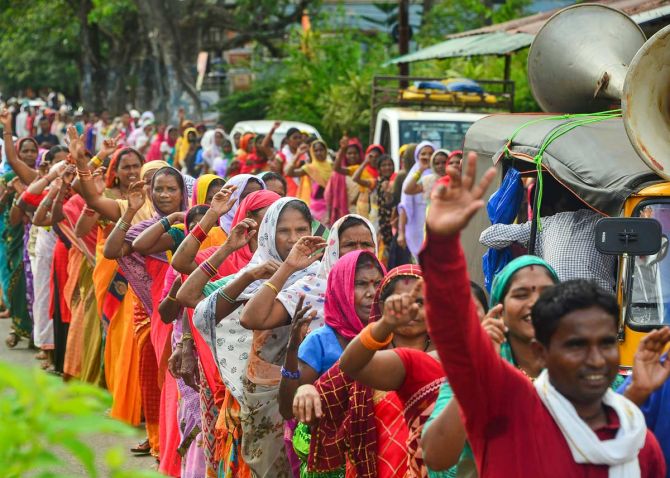
Against this, price rise and inflation touch everyone, the rich and poor alike, and there is an increasing perception, both among the poor and the middle classes, that Modi's BJP is pro-rich -- though that perception has often defied logic, so to say.
But then, the prime minister seem hoping to compensate the losses to individuals and families through recruitment for one million jobs in the 18-month run-up to the Lok Sabha polls.
Here the Congress especially is on a stronger wicket, rubbing the voter's memory about the economic performance and parameters under the Manmohan Singh government. However, the party's sustained campaign is often couched in terms that addresses the elite media-watchers, as they have no grassroots-level supporters to translate in terms that the rural masses understand.
Yet, if Modi is able to provide jobs to a million -- there is no reason now to suspect it -- like the freebies that his government had offered all across the country through five years till elections 2019 and which Modi wants to end, as if to stifle the more imaginative initiatives of regional parties at the helm in multiple states -- it could be a winner.
How far and how much would however be too early to predict just now!
N Sathiya Moorthy, veteran journalist & author, is a Chennai-based policy analyst and commentator.











 © 2025
© 2025